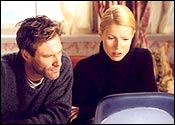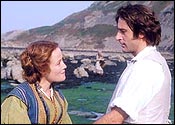
|
Erotic or poetic?
Possession makes poetry look sexy
|
Jeet Thayil
There is a scene in Possession in which Roland Mitchell (Aaron Eckhardt) is sitting in some unnamed British library researching Victorian poet laureate Henry Randolph Ash (Jeremy Northam).
In this short scene, the camera pans through the stacks and stops when it gets to Mitchell. It lingers on his dishevelled hair and casual chic attire. It drinks the light he is bathed in.
In other scenes, Maud Bailey (Gwyneth Paltrow) comes upon Mitchell, reading poetry or writing his own. Mitchell is a studly-like literary fellow (he is literally an American on a fellowship in England) who lounges about bare-chested or in T-shirt and jeans. Though rumpled, he is attractive in a louche sort of way.
But Possession's real stud is Ash, the long-gone poet Mitchell is researching. As played by Northam, Ash shows a dark Byronic appeal and sunny sensitivity. His wife dotes on him. His mistress adores him. With his wife Ash plays chess. With his mistress, poet Christabel LaMotte (Jennifer Ehle), Ash actually scales the heights of passion, to use a suitably torrid clichι.
Mitchell discovers a love letter from Ash to LaMotte in a library book, and ends up taking the letter to Bailey, the most prominent LaMotte scholar in England. Together they enter upon an enterprise of literary detection to find out what actually happened and, presumably, be first out of the gate with a tell-all biography. As the modern day couple trails the Victorians, passion follows.
The result of all this doubling is that Possession manages to pull off a daring idea: making poetry sexy. Poetry has always been the sexiest of the literary forms. A fact we seem to have forgotten since the excesses of the 19th century were replaced by the staid smarminess of the 20th.
For every Byron or Shelley of a bygone era, there was a Robert Frost or T S Eliot closer to our time who managed to strip the sex and drugs from poetry and cloak it with academic respectability and, sadly, some measure of biographical boredom.
A S Byatt's book attempted to bring back some of the erotic power that has always been associated with poetry. Possession director Neil LaBute, in adapting the book to the movies from a screenplay by David Henry Hwang, Laura Jones and himself, has wrought some crucial changes that are only partially successful.
For one thing, LaBute transforms Mitchell's character from a lower class Englander to an American in England. This takes away the erotic charge of sex between the classes that writers from D H Lawrence to Somerset Maugham have successfully employed. Then again by making Mitchell American, LaBute and Hwang are able to use other avenues for delight.

In one scene the initially hostile Bailey (played by Paltrow with a British accent so resonant she must be an Anglophile) and the emotionally reticent Mitchell are lying in bed talking, of all things. Their Victorian counterparts would not have wasted time with words, they would have got right down to the immediate physical action.
Coming back to the two, Bailey tells Mitchell that the flip side of obsession is repulsion. That is Freud, says Mitchell, displaying a talent for literary allusion. Then, in one of the film's better lines, Mitchell says he may be wrong: it may not have been Freud after all; it may have been Calvin Klein.
When Bailey laughs --- and Gwyneth Paltrow laughs beautifully, it is an exercise of the facial muscles that is unavailable to mortal women --- at his one-liner, we in the audience know she is finally ready for Mitchell. What happens next is a good reason to go see the film for yourself.
The switching between the Victorian lovers and the post-modern ones is done effectively and with minimum fuss. The camera pans between centuries in the space of a heartbeat, without the contrived cinematic tools we have all grown sick of. At one moment we are in a world of horse carriages and gowns, in the next a car sits throbbing outside a subway station.
 Compared to the cool detachment of Bailey and Mitchell, the Victorian lovers seem like tabloid fodder. There is pregnancy, lesbianism, suicide, deception, even a hint of murder. Ash and his mistress are willing to throw it all away for the fleeting joys of love's brief moment. Mitchell and his lady, on the other hand, are so modern they cannot even kiss. They are not possessed by anything, not by love, not by poetry. It is a uniquely modern failing.
Compared to the cool detachment of Bailey and Mitchell, the Victorian lovers seem like tabloid fodder. There is pregnancy, lesbianism, suicide, deception, even a hint of murder. Ash and his mistress are willing to throw it all away for the fleeting joys of love's brief moment. Mitchell and his lady, on the other hand, are so modern they cannot even kiss. They are not possessed by anything, not by love, not by poetry. It is a uniquely modern failing.
For a story that celebrates English poetry, which in turn celebrates the glories of the English landscape, the glimpses of England's 'green majesty' are all too brief. When the viewer does see a vista of gently rolling hills, it seems like a painterly vision, too beautiful to be real. Much like poetry.